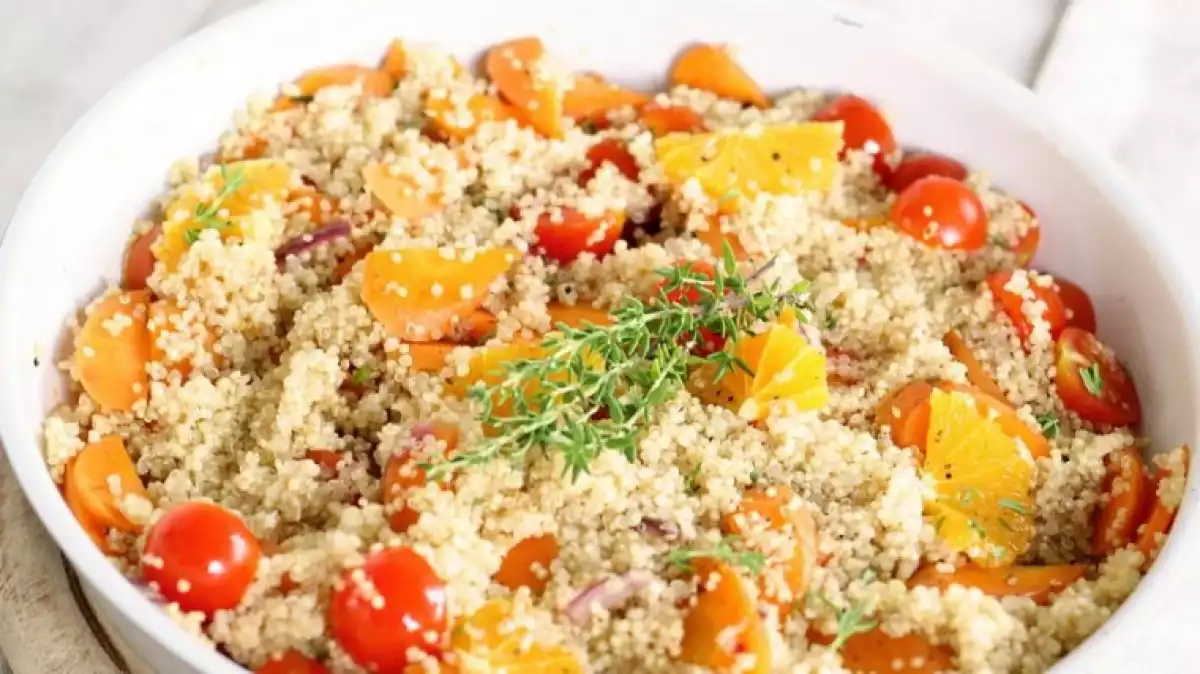Quinoa is a pseudocereal native to the Andes. In recent years this food has become popular throughout the world, especially in Europe, North America, China, Japan, and Australia. In this article, we will analyze the nutrition and benefits of this seed, a very healthy food that we can easily include in our diet.
What is quinoa?
The quinoa plant belongs to the Amaranthaceae family, to which spinach and beet also belong. It is considered a pseudocereal because, although it is not a grass, it is used similarly in cooking. It originated in the Andes and was extensively cultivated between 3 and 4 thousand years ago in the Lake Titicaca region, which is now part of Bolivia and Peru. Currently, these countries are the largest producers of quinoa in the world.
For the Incas, this pseudo-cereal was a sacred plant, and they called it 'mother of all grains' ('chisoya mama'). The Spanish conquerors forbade the Andean natives to plant it and forced them to grow wheat. The increase in popularity of this seed in recent years has increased the value of these crops; between 2006 and 2013 quinoa prices tripled. Today, this plant's crops are worth about ten times more than wheat.
Quinoa nutrition facts
Quinoa contains high levels of protein, carbs, soluble fiber, vitamins, and minerals, while it is free of other compounds that can be harmful to our body, making it an excellent substitute for less healthy foods. Its dietary composition gives it many benefits for the body.
1. Rich in fiber
The consumption of quinoa provides us with a lot of soluble fiber, which prevents the appearance of cardiovascular diseases and stimulates intestinal activity facilitating excretion. Although all cereals and pseudocereals provide fiber, the levels present in quinoa seem to be unusually high, so its consumption is not advisable in gastrointestinal episodes such as diarrhea.
2. Prevents diseases
Quinoa is rich in flavonoids, a type of antioxidant that has beneficial properties for the elimination of viruses and microbes and the prevention of some diseases, such as cancer, diabetes, osteoporosis and heart disease. Among the flavonoids present in quinoa are quercetin and kaempferol, which have anti-inflammatory effects. Its levels of antioxidants increase even more after the seeds sprout.

3. Gluten-free
Quinoa is an ideal food for people with celiac disease; not only is it gluten-free, but it also contains more antioxidants, proteins, minerals, vitamins, and fiber. In other words, it has a higher nutritional value than other gluten-free foods, such as rice, corn or potatoes. Celiacs are therefore advised to include this pseudo-cereal as a staple in their diet.
4. Rich in proteins
Unlike most plants, quinoa contains the nine essential amino acids, so its proteins are of particularly high quality, as much as those provided by meat. However, this grain should be combined with other sources of protein containing fewer calories and carbohydrates.
5. Good for your heart
Quinoa contains oleic acid, a type of monounsaturated fat. These fatty acids are healthier than the saturated ones found in meat. They also appear to reduce the risk of heart attack and probably other alterations of the cardiovascular system.
Also, the high levels of soluble fiber in quinoa can help to reduce blood pressure and cholesterol, which prevents the onset of heart disease and other cardiovascular disorders, especially atherosclerosis.
6. Low glucose levels
The low glucose levels present in quinoa mean that regular consumption of this food prevents the onset of type 2 diabetes, as well as obesity and heart disease. These benefits are shared by other similar plants, such as cereals. However, this habit must be accompanied by many others such as a balanced diet and regular exercise. Also, the anti-inflammatory properties of this grain are beneficial in improving the body's response to insulin, which also contributes to the prevention of diabetes.

7. Promotes weight loss
Quinoa is beneficial for weight loss for several reasons. Firstly, as we have said, the low levels of glucose contained in this superfood prevent obesity. Proteins and soluble fiber help to lose weight because they increase the feeling of satiety, reducing the desire to eat more food. Also, the human body cannot get calories from soluble fiber.
Why is quinoa good for you?
This seed is a very nutritious food, especially if we compare it with similar plants such as cereals. Also, among its nutritional properties, we find several benefits for our health, especially at cardiovascular and digestive level.
Besides, it is a very versatile ingredient to cook with, as it can be used as flour, cooked and even fermented; this allows us to use it as a substitute for other less healthy foods regularly to make many different dishes, from biscuits to soup. Given the multiple nutritional and health benefits of quinoa, it is easy to understand why the Incas considered it a sacred food.
- This article about "Quinoa" was originally published in Spanish in Viviendo La Salud

